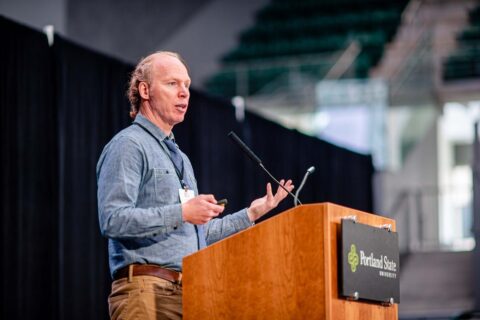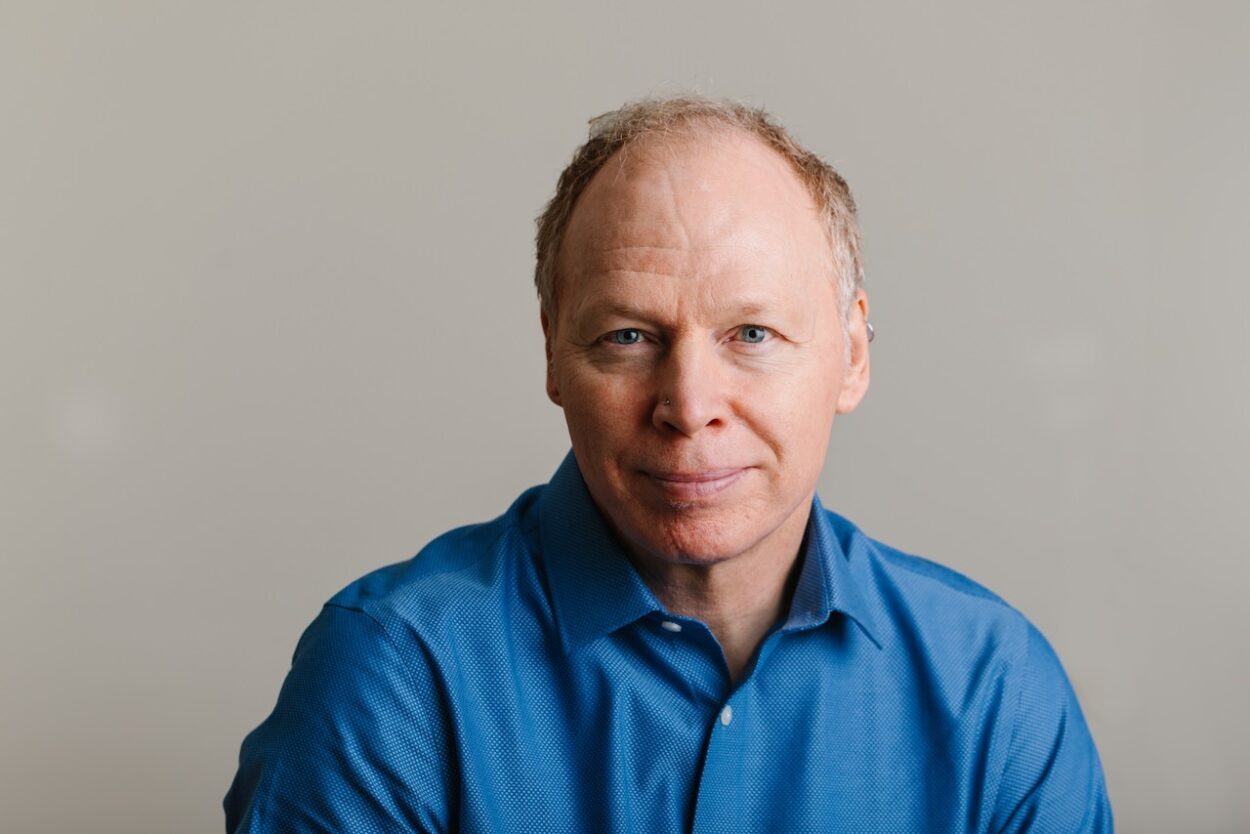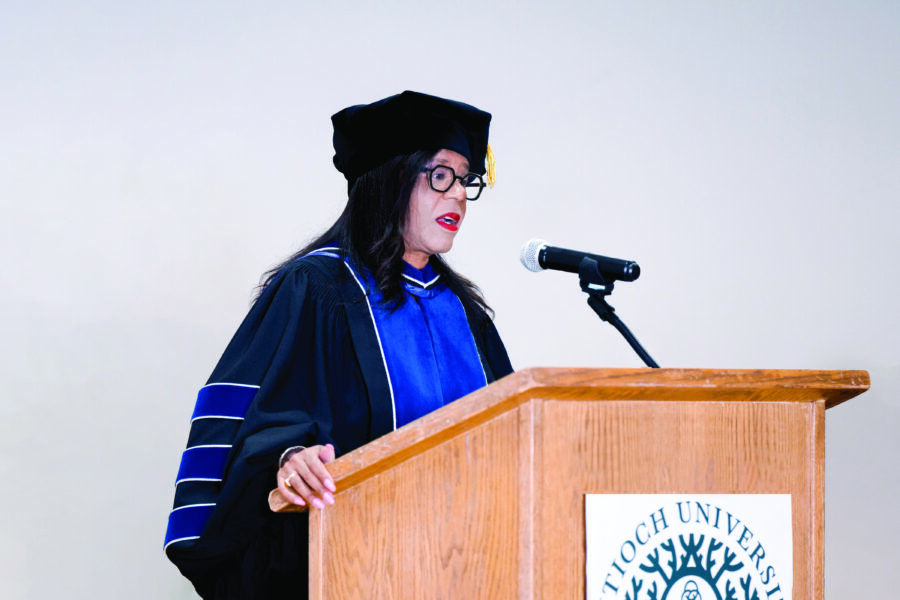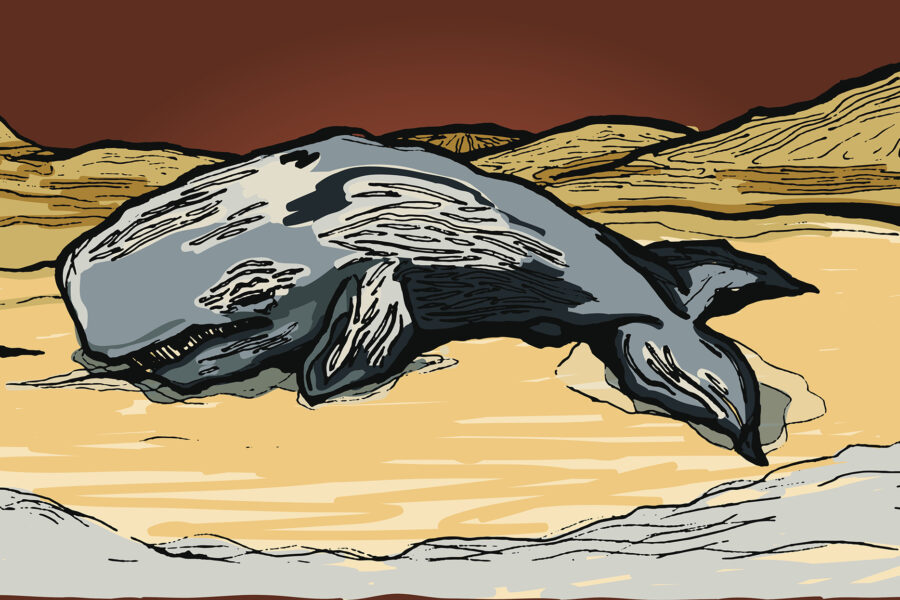Nearly every day of the year, some part of humanity is facing an untameable wildfire, or extreme heat, or deep drought, or torrential flooding. This inescapable fact, and the accelerating logic of climate change, mean that for most of us it’s only a matter of time before a climate disaster comes to our own neighborhood. It’s awful to think about. But psychologist Thomas Doherty ’02 (New England, PsyD) has had to come to terms with this unfortunate reality. And he has come up with a metaphor: imagine that, at any given time, there are a bunch of darts being thrown at the earth. If you’re in the wrong place at the wrong time, there’s no helping it, you will be caught in a climate disaster.
Contemplating the way this unfolding crisis makes us feel is, in fact, part of Doherty’s job: he is one of the leading experts on the concepts of climate grief and ecotherapy. He actually served on the American Psychological Association’s 2008 task force that defined the term “climate grief.” He has built the client-serving part of his practice around ecotherapy and helping those who find themselves anxious or depressed or otherwise impacted by the climate emergency. And he also trains and supervises other climate-conscious therapists, along with researching and writing about this subject.
Because of all this time he’s spent thinking about this topic and helping others process their own feelings about it, he is unusually well-prepared for those times when he might find himself personally connected to a climate disaster. Still, this summer, when Lahaina—the old capital city of Maui—burned to the ground, Doherty found himself grieving, and grappling with feelings of climate-induced depression.
He has a personal connection to Lahaina and loves the place and its people, so seeing it destroyed was “like a death,” he says, or a “gut punch.” Seeing graphic images of burned-out vehicles on the news couldn’t help but make him wonder, “What would happen if I were there, and if I were trapped?”
“It’s impossible to always be positive,” he says.
We do need to find ways to keep on going, though. And ideally we want to thrive both personally, and hopefully as active participants in the society-wide work of addressing, minimizing, and mitigating climate change. And that is where Doherty’s work has valuable insights for all of us trying to navigate a world of climate uncertainty.

Intervening on the Doom Spiral
A central problem many of us face is a pervasive sense of impending disaster mixed with a helplessness to avoid it. The confluence of media at the time of a natural disaster especially can make it so that traumas experienced by people hundreds or thousands of miles away can affect us from a distance. In more psychological terms, emotional impacts can occur in people vicariously—this concept is one that Doherty himself helped to bring to the forefront of medical research.
Another part of this problem is that climate change can feel so massive that it’s difficult to imagine how the individual can possibly be of any help. Most people have an environmental epiphany at some point in their life, when they realize how much impact their actions have on the planet. And yet it can feel ridiculous to try to address massive environmental disruptions by recycling more, eating somewhat less meat, or buying an electric car.
Doherty reminds us, “There’s a superficial understanding that climate change is an individual problem of personal choice.” But, he says, we didn’t create the economy or the systems in which we live, and unless large corporations get on board, we are “climate hostages” with little control over the world around us. One of the hardest things about dealing with climate change is that it requires us to work together, and humans have a hard time doing that.

One way of navigating this is through focusing on our environmental identity. This is an idea that Doherty first picked up from educators in Antioch’s Environmental Studies department in New England, and he helped import it into psychology. Environmental identity is your sense of self and identity in relationship to the natural world. This is related to questions of where you choose to live, how you recreate, where you grew up, and whether you’re more drawn to city or rural living. To start investigating your own environmental identity, Doherty suggests you think about your story and your history. Ask yourself: What is meaningful for me? How do I stay healthy? What makes me happy?
Once we find a set of values regarding climate change, it’s easier to stay on course because one little thing won’t throw us off. If we tap into our deep beliefs about the environment, then we’re more resilient. It’s important to find your authentic action, something specific that you can do that is personal to you. Maybe it’s volunteering at an animal sanctuary or a local recycling center, or something smaller, like taking a five minute walk every day.
“I want people to take action, and I want them to spend time,” Doherty says. “But it’s a marathon, not a sprint.” And he suggests that working on our own personal sustainability can be a foundational step towards effectively tackling bigger societal issues. In short, you should make sure your health is good and that you are getting good self-care, sleep, and exercise, or as best you can, so you can be your best self when you take on the environmental crisis.
Healing Through Eco-Therapy
Another strategy that can be especially effective for those dealing with climate grief and climate anxiety is eco-therapy. This term refers to any form of mental health counseling that brings in nature or the natural world. Sometimes—as in Doherty’s private practice—this can take the form of a therapist meeting their clients outdoors, while walking in nature. There is a healing immediacy to being outside, in nature, as you think about these topics—and ecotherapy can be effective for all sorts of mental health concerns, not just climate-related ones.
Overall, Doherty aims to validate the concerns of his clients. His adage is: “Validate, elevate, and create.” He encourages everyone he works with to see their environmental concerns as, at times, the most important thing, and to get creative about solutions.
Still, it’s a huge issue and it’s easy to get overwhelmed. “Therapists themselves are feeling the heat, the storms, the floods,” says Doherty. “So there’s a sense of pressure that’s very unique regarding eco-therapy.” Even he is feeling the grief and anxiety related to this recent wave of disasters. But he takes comfort in the fact that he is doing what he can, in the way that only he can do it.
Four Strategies for Coping with Environmental Grief and Anxiety
- Assess your media intake. Focus on local and positive news to avoid the feeling that we are in a constant state of global catastrophe.
- Incorporate mindfulness. Take a walk and breathe, bringing your attention to your surroundings.
- Get yourself into nature. Visit local parks, hiking trails, or nature centers. People tend to have a shift in consciousness when they get outdoors.
- Center your distinctive self in sustainability work. Look for places where you can leverage your specific skills to make a difference in community with others.



